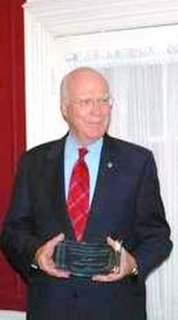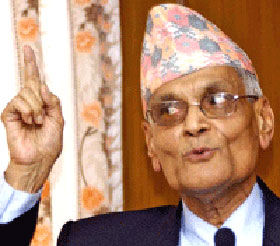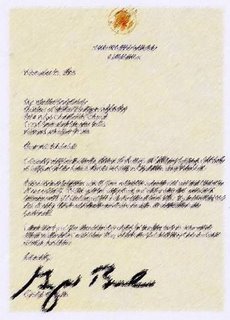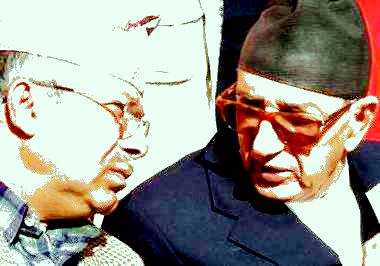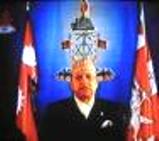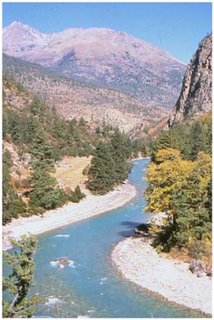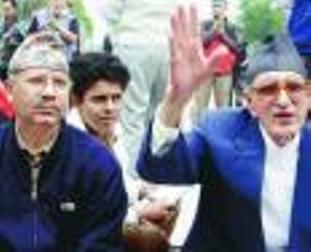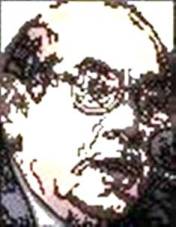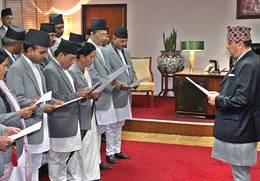 House of Representatives Speaker Tara Nath Ranabhat has advised King Gyanendra to hand over power to the political parties -- for a different reason. He believes that's the only way the monarch can rise above controversy.
House of Representatives Speaker Tara Nath Ranabhat has advised King Gyanendra to hand over power to the political parties -- for a different reason. He believes that's the only way the monarch can rise above controversy.Ranabhat provides a refreshing contrast to luminaries ranging from U.S. Senator Patrick Leahy to Indian M.P. Sita Ram Yechuri, who have been warning King Gyanendra to relinquish absolute power to preserve his throne.
Maila Baje can hardly quibble with Ranabhat's contention that the constitution does not recognize the current government.
In the esteemed view of our Right Honorable Gentleman from Kaski, the monarch must work to normalize the constitutional process either by reinstating the House of Representatives or by holding fresh parliamentary elections.
Maila Baje has long stopped taking Ranabhat's words lightly. While much of the country was mocking his "rat-tat-tat-tat…" while presenting the official inquiry report on the Narayanhity carnage three years ago, Maila Baje lost no time in crediting him with pre-empting any massive public disorder such a highly sensitive subject would almost certainly have ignited.
In recent years, Ranabhat has set a record of sorts in the annals of parliamentary practice. Technically, a fraction of the Upper House exists. But it's the speaker of the lower house – dissolved over three years ago -- who retains his position.
Ranabhat, moreover, has been representing Nepal at countless international parliamentary conferences while the monarch has been battling criticism for having dispensed with representative governance.
If the Nepali Congress had remained a cohesive entity, the lower house of parliament would have completed its natural life last year.
Say the UML, RPP and the smaller parties had observed full parliamentary decorum as King Gyanendra outlined the annual policies and programs of an elected government in three successive speeches from the throne.
Would the country have been able to hold elections by May 2004? Probably not, unless the mainstream parties could've pulled off their 12-point deal with the Maoists then.
One thing is clear, though. Ranabhat's position would have remained unaffected today regardless of whether executive power flowed from Narayanhity or Singh Durbar.
Legally, we are told, the speaker retains his job until the moment he files his nomination papers for the election. Ranabhat seems to eschew that view.
He insists he remains in office only because of the good graces of Girija Prasad Koirala. (Incidentally, it was Koirala who, as pro tem speaker, oversaw Ranabhat's election to the full post in June 1999.)
Evidently, the Nepali Congress supremo, who Ranabhat was instrumental in ousting as premier in 1994, wants to preserve that last link to democracy.
Maila Baje, however, feels there is another Koirala-linked strand to the story on how Ranabhat came so close to becoming prime minister twice after King Gyanendra's October 4, 2002 foray into active politics.
That strand may have some relevance to Ranabhat's latest remarks.
In seeking to raise the monarch above controversy, Ranabhat might be aiming for much more than self-preservation.
The restoration of the house – which Maila Baje feels is Ranabhat's first preference – would logically restore Sher Bahadur Deuba's government.
More importantly, it would unleash a fresh round of horse-trading between the Koirala and Deuba factions of the ruling Nepali Congress, which technically remains undivided in its "parliamentary-party" form.
In the ensuing free-for-all, only Ranabhat would succeed in staying above controversy, wouldn't he?





